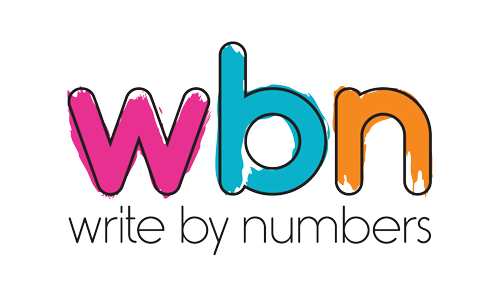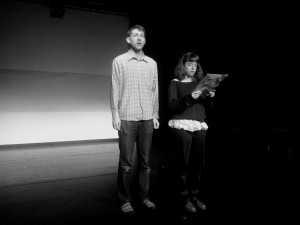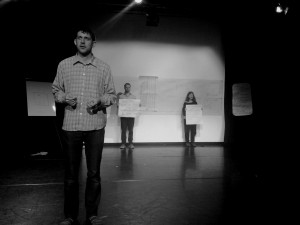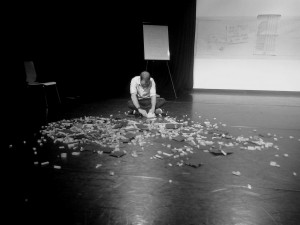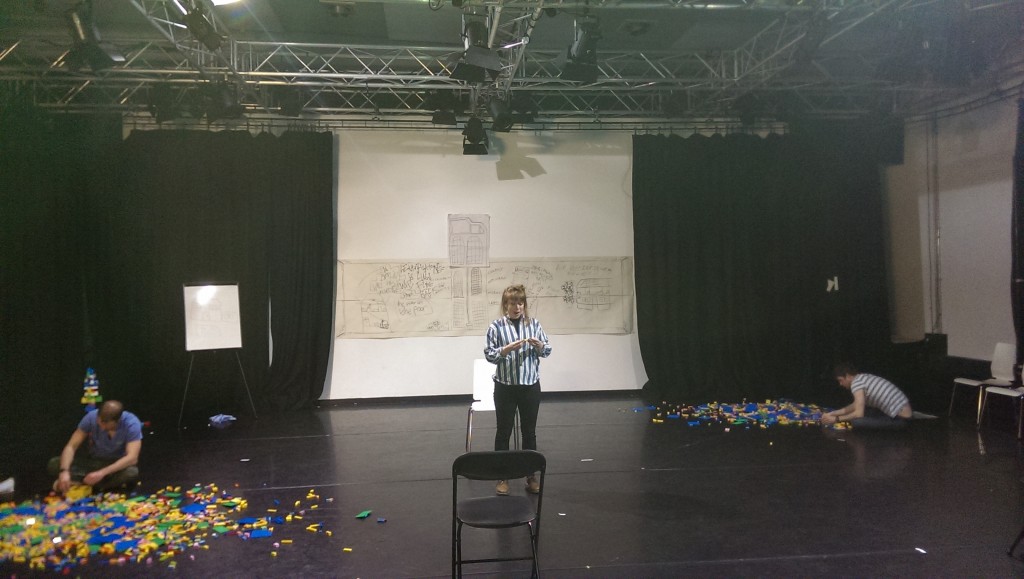A few weeks ago, when I was still bumbling through pages of research for Regeneration, I sent Charlie an email. It had one sentence in it:
“I have just realised WE ARE WRITING A STATE OF THE NATION PLAY.”
There weren’t any more words because, as soon as I wrote that sentence, I had to breathe into a paper bag for a little bit.
(NB: I’ve googled to try and find a good concise definition of ‘state of the nation play’ but it seems everyone expects you to understand the term implicitly. There are longer explorations, should you wish to tread there, here and here.)
It probably shouldn’t have come as as much of a shock as it did. Unlike the other plays I’ve created text for for WBN this one didn’t come out of an initial character idea. It came out of a subject.
Or rather, at first it came out of a process.
Since we saw Architecting in the Barbican Pit back in 2010, Charlie and I have wanted to make a play like the TEAM make a play. We wanted to do a huge research process and have multiple writers and an epic scope and history and literature and music and now, now, now. Only, where the TEAM make theatre about the USA, we wanted it to be about England.
The desire to do this is something we’ve come back to, with varying degrees of scale. We considered writers we’d like in the room, how to get a balance of styles, how we might structure a very long research process, how we might collectively decide what the subject was going to be. Then, a couple of years ago, an AD invited us to pitch some ideas to him for work we’d like to develop and (along with the play which would eventually become Blueprint, about which you’ll be hearing more than you ever probably wanted to in the coming months) we pitched the idea of us undertaking this R&D process. We didn’t provide a subject matter for it – just that we wanted to do this process. As is the way, nothing came out of that initial meeting – other than a stay in touch, but it got us thinking about maybe, actually doing this thing. The same AD invited us to submit a proper proposal to him six months or so later, and another London theatre was doing an open call out for proposals at the time, so we did some further thinking and this further thinking led us to conclude that we’d probably better propose a subject matter. And, undoubtedly influenced by our own experiences working in Brixton and Walthamstow, simultaneously Charlie and I came up with: regeneration. Then we got excited because, for the first time, it felt we had a subject matter to match our process.
Then, we pitched and got a polite no thank you. Which actually turned out to be a Good Thing, because we ended up making Beneath the Albion Sky instead and thus all is history. It also convinced us that no one was going to buy into the process, because there was – and we’d been honest about this – the possibility it might end in total utter failure. So, as is the way with WBN, we thought about how we might make it come about ourselves. And, as Charlie and I were so enthused by writing about regeneration (and we didn’t know if other writers we knew would be to the extent that we were) we thought we’d go ahead and co-write it. And, if we weren’t going to go all out on the writing process, then we were on the play itself. And, off of the back of Albion, we got a chance to do a paid scratch of 15 minutes of text at Salisbury Arts Centre last November. From which we all concluded: yes, we did have a play here.
Now, with Rich Mix providing development support, we’re probably a third of the way through the first proper stage of development for Regeneration. And, there is probably no way to describe the text currently other than: big. It’s got three major plot strands which, between them, run from 1903 to 2015. We see London grow from 1980 to the present day, but we also visit Berlin and New York and Newfoundland and, crucially, Yorkshire. People fall in (and out) of love, there are riots, a birth, a house which moves across place and time. There’s even some Spike Lee and Boris Johnson in there. There’s quite a lot of Lego too.
There are also times where the play gets proper, full-on angry. It’s the first time I’ve made a play which, even momentarily, does this (though admitedly I doubt anyone could see Reasons for Listing and come out being unclear as to my position on the importance of libraries). Somehow, the scope of Regeneration seems to have opened up the space for us to do this and it feels okay for us to include some of our anger. It’s also got space for us to be playful and funny and bemused and tell stories and make myths. But it’s maybe the fact that it can hold all of this – including the anger – that makes it the scarily official sounding ‘state of the nation’ (even when its form might suggest it is anything but).
I guess this blog post is therefore a dollop of writerly confession as we attempt to get the play up on its feet in the coming weeks. In Regeneration we’re making something that scares me. And that’s exciting.
